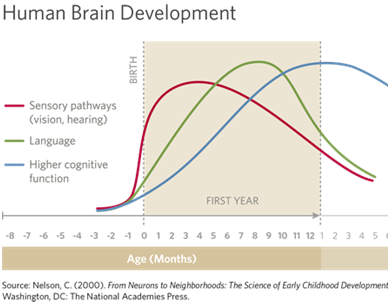Lesson 2: Prenatal Development
Attention
Learning Outcomes
Upon completion of this lesson's material, students will be able
- Explain how a mother’s voice impacts a baby’s brain development.
- Explain how knowledge of prenatal brain development impacts partnerships with families.
Teaching
By day 27 in the womb, a baby’s brain begins to form. At five weeks, the first synapses begin to form into the spinal cord and by six weeks the early neural connections start the first spontaneous movements. During the second trimester, a baby’s brain has grown enough to start coordinating sucking and swallowing reflexes, and rhythmic breathing. By the end of the third trimester, the infant has started to have conscious experiences, voluntary actions, thinking, remembering and feeling. ALL WHILE IN THE WOMB!!! A fetus is also capable of controlled responses to repeated auditory stimulus (dog barking or sirens).

With such sophisticated brain development in the womb, there comes a huge responsibility of the parent who is carrying the fetus. There are multiple factors that can impact a baby's brain development and influence its growth. We will learn about those impacts later on in the course, but let's take a look how a baby's brain develops during the last three months in the womb (assuming healthy fetal development). As you can see in the graphic, sensory pathways (red), language (green), and higher cognitive function (blue) have all begun their development at just 6 months into the pregnancy. There is still 3 months to go so you can imagine the jumpstart that fetus is getting!
Studies have shown that when a baby is born, it recognizes and prefers its own mother's voice. Due to physical development and connections within the brain, there are opportunities for a fetus to hear its mother's voice and differentiate tones and pitch by the time the fetus has reached by 6 months gestation. Some studies even suggest that it can hear sounds from the outside world and understands the consistent sounds well enough to retain memories of them after birth! Think of it this way, if a pregnant mom listens to country music and sings her favorite song every day to and from work, the infant may recognize that same song after birth and feel comforted when heard.
This is the same for any sort of consistent rhythm (speech, music, sound etc.), that a fetus may hear when in the womb. When that fetus is born, it already has a strong foundation for sensory pathways, language and higher cognitive functioning. He or she may remember all of those consistent rhythms and already have a foundation for learning.
Keep in mind however, that this is all assuming that the mother had a fairly healthy pregnancy without major complications or toxic stress. There are always different cases and factors to consider.
Assessment

Lesson 2 Assignment
Read the short write up by Washington University, While in Womb, Babies Begin Learning Language from Their Mothers. Think about the sentence, “The mother has first dibs on influencing the child’s brain.” Write a summary about the depth of this statement. Explain in detail, with examples:
1. What does this mean for infant brain development?
2. How does this knowledge impact the way you will partner with families?
